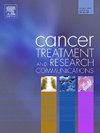使用endopdict分析墨西哥乳腺癌妇女的基因组特征。
Q3 Medicine
引用次数: 0
摘要
目的:在墨西哥乳腺癌发病率和死亡率上升的背景下,我们的研究深入研究了被诊断为I-III期乳腺癌的墨西哥妇女的基因组景观。方法:采用endoppredict测试进行基因组分析,我们的回顾性横断面研究探讨了基因组表达与免疫组织化学(IHC)之间的相关性。结果:50例女性患者中,免疫组化风险分层显示50%为高危,50%为低危,两组临床及组织学差异显著。高危样本肿瘤较大,组织学分级较高,淋巴结阳性较多。免疫组化结果显示与endoppredict测试有中等程度的一致性(kappa Cohen’s 0.48),强调其临床可靠性优于免疫组化。结论:该研究提倡整合基因组工具,特别是endoppredict测试,用于墨西哥女性乳腺癌的管理,以提高治疗决策的准确性。我们的研究结果为墨西哥人群乳腺癌诊断和管理的发展前景提供了宝贵的见解。本文章由计算机程序翻译,如有差异,请以英文原文为准。
Characterization of genomic profiling of Mexican women with breast cancer using EndoPredict
Purpose
In the context of rising breast cancer incidence and mortality rates in Mexico, our study delves into the genomic landscape of Mexican women diagnosed with stage I-III breast cancer.
Methods
Employing the EndoPredict test for genomic analysis, our retrospective, cross-sectional study explores correlations between genomic expression and immunohistochemistry (IHC).
Results
Among 50 female patients, risk stratification by IHC revealed 50 % as high risk and 50 % as low risk, with notable clinical and histological distinctions between the two groups. High-risk samples exhibited larger tumors, higher histological grades, and more positive lymph nodes. Immunohistochemistry results displayed a moderate concordance (kappa Cohen´s 0.48) with the EndoPredict test, emphasizing its clinical reliability over IHC.
Conclusions
The study advocates for the integration of genomic tools, particularly the EndoPredict test, in the management of breast cancer in Mexican women for enhanced precision in treatment decisions. Our findings contribute valuable insights to the evolving landscape of breast cancer diagnosis and management in the Mexican population.
求助全文
通过发布文献求助,成功后即可免费获取论文全文。
去求助
来源期刊

Cancer treatment and research communications
Medicine-Oncology
CiteScore
4.30
自引率
0.00%
发文量
148
审稿时长
56 days
期刊介绍:
Cancer Treatment and Research Communications is an international peer-reviewed publication dedicated to providing comprehensive basic, translational, and clinical oncology research. The journal is devoted to articles on detection, diagnosis, prevention, policy, and treatment of cancer and provides a global forum for the nurturing and development of future generations of oncology scientists. Cancer Treatment and Research Communications publishes comprehensive reviews and original studies describing various aspects of basic through clinical research of all tumor types. The journal also accepts clinical studies in oncology, with an emphasis on prospective early phase clinical trials. Specific areas of interest include basic, translational, and clinical research and mechanistic approaches; cancer biology; molecular carcinogenesis; genetics and genomics; stem cell and developmental biology; immunology; molecular and cellular oncology; systems biology; drug sensitivity and resistance; gene and antisense therapy; pathology, markers, and prognostic indicators; chemoprevention strategies; multimodality therapy; cancer policy; and integration of various approaches. Our mission is to be the premier source of relevant information through promoting excellence in research and facilitating the timely translation of that science to health care and clinical practice.
 求助内容:
求助内容: 应助结果提醒方式:
应助结果提醒方式:


